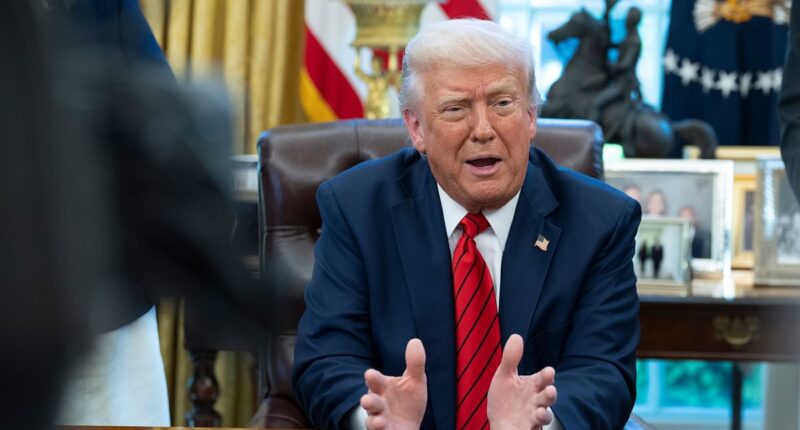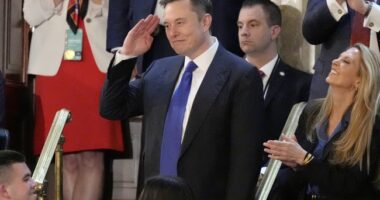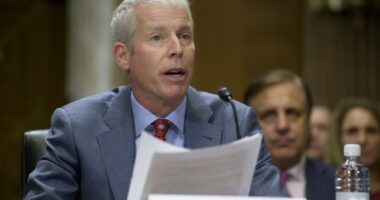
President Donald Trump was ecstatic on Thursday when the Supreme Court decided to hear his birthright citizenship case.
‘I am so happy,’ he said.
‘I think the case has been so misunderstood,’ the president added.
Reporters questioned Trump in the Oval Office shortly after the Supreme Court announced it would hold hearings on his efforts to end birthright citizenship. Birthright citizenship is the concept that individuals are granted citizenship automatically when they are born.
In the United States that principle has been enshrined in the Constitution for over 150 years.
For his part Trump claimed the idea was tied to ‘slavery.’
Trump argued that birthright citizenship is not about tourists visiting and gaining citizenship by touching a piece of land. Instead, he claimed it is a matter related to slavery.
‘If you look at it that way, that case is an easy case to win.’
The Trump administration made an emergency request to the Supreme Court to overturn lower court decisions that had halted an executive order Trump had issued on his first day in office.
Under that order, which was due to take effect February 19, children born to parents in the United States illegally or on temporary visas would not automatically become US citizens, radically altering the interpretation of the Constitution’s 14th Amendment.
The Supreme Court said it would hear oral arguments on the case on May 15 but left the halt on the order in place.
The 14th Amendment was ratified directly after the Civil War. Previously enslaved black Americans and their children were not considered citizens. The amendment gave them citizenship by saying all people born in the U.S. had that right.
But courts also ruled the amendment applied to those of any nationality born in the United States.
In 1898, the Supreme Court affirmed birthright citizenship in a landmark case, United States v. Wong Kim Ark, guaranteeing automatic citizenship for nearly all children born in the country.
Since then, courts have upheld that expansive interpretation.
But some conservatives have a different view.
The 14th Amendment includes a phrase that citizenship applies only to people who are ‘subject to the jurisdiction’ of the United States.
Some conservatives have argued that foreign national parents who are in the US illegally may not be viewed as meeting that requirement.
In his January 20th executive order, Trump tried to redefine the 14th Amendment by saying children born to illegal immigrants or to those on temporary non-immigrant visas are not citizens at birth.
He called citizenship ‘a priceless and profound gift.’
The Trump administration argued that children of noncitizens are not ‘subject to the jurisdiction’ of the United States, a phrase used in the amendment, and therefore are not entitled to citizenship.
States, immigrants and rights groups sued to block Trump’s executive order and accused the administration of trying to unsettle the broader understanding of birthright citizenship that has been accepted since the amendment’s adoption.
The order remains paused until the Supreme Court can hear the case next month.
The Trump administration asked the Supreme Court to find that lower courts had erred in imposing bans on the birthright citizenship policy that extended beyond the parties involved in the litigation.
The administration instead wants the justices to allow Trump’s plan to go into effect for everyone except the handful of people and groups that sued.
Failing that, the administration says that the plan could remain blocked for now in the 22 states that sued.
It did not ask the court to weigh in on the constitutionality of that executive order, which was challenged soon after it was signed.
But the justices probably will find it hard to avoid that underlying issue.
If the court is inclined to agree with the administration, it risks creating a confusing patchwork of rules in which the state in which a child is born could determine whether citizenship is granted automatically.
Several justices have raised concerns in the past about nationwide, or universal, injunctions, but the court has never ruled on the matter.
The administration made a similar argument in Trump’s first term, including in the Supreme Court fight over his ban on travel to the U.S. from several Muslim majority countries.
The court eventually upheld Trump’s policy, but did not take up the issue of nationwide injunctions.

















